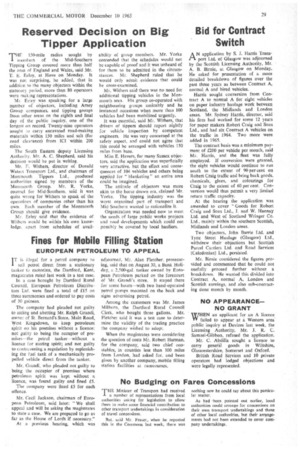Reserved Decision on Big Bid for Contract Tipper Application Switch
Page 31

If you've noticed an error in this article please click here to report it so we can fix it.
THE 150-mile radius sought by members of the Mid-Southern Tipping Group covered more than half the area of England and Wales, said Mr.
T. E. Eeley, at Hove on Monday. It was not surprising, he added, that in addition to the many objectors within the statutory period, more than 80 operators were making representations.
Mr. Eeley was speaking for a large number of objectors, including Amey Group companies, and tipping groups from other areas on the eighth and final day of the public inquiry, one of the
longest on record. Twenty-nine operators sought to carry excavated road-making materials within 150 miles and salt (for road clearance) from ICI 'within 200 miles.
The South Eastern deputy Licensing Authority, Mr. A. C. Shepherd, said his decision would be put in writing.
Mr. F. Withers, director of Donald Waters Transport Ltd., and chairman of Monmouth Tippers Ltd., produced authorities signed by members of the Moninouth Group. Mr. R. Yorke,
counsel for Mid-Southern, said it was quite wrong for Withers to speak of the operations of companies other than his own. Each member of the Monmouth Group should give evidence.
Mr. Eeley said that the evidence of Withers would be within his own knowledge, apart from schedules of avail
ability of group members. Mr. Yorke contended that the schedules would not be capable of proof and it was unheard of for them to be admitted in the circumstances. Mr. Shepherd ruled that he would only admit evidence that could be cross-examined.
Mr. Withers said there was no need for additional tipping vehicles in the Monmouth area. His group co-operated with neighbouring groups amicably and he instanced occasions when more than 100 vehicles had been mobilized urgently.
It was essential, said Mr. Withers, that drivers of tippers should report nightly for vehicle inspection by competent engineers. He was very concerned at the safety aspect, and could not agree that this could be arranged with vehicles 150 miles from base.
Miss E. Havers, for many Sussex objectors, said the application was superficially very attractive, but the effect and consequences of 104 vehicles and others being applied for " blanketing " an entire area could be imagined.
The attitude of objectors was more akin to the horse drawn era, claimed Mr. Yorke. The tipping industry was the worst organized part of transport and Mid-Southern wanted to rationalize it.
Organization was needed now to meet the needs of large public works projects and road developments which could not possibly be covered by local hauliers. A N application by S. J. Harris Transinport Ltd. of Glasgow was adjourned by the Scottish Licensing Authority, Mr. A. B. Birnie, at Glasgow on Monday. He asked for presentation of a more detailed breakdown of figures over the past three years as between Contract A, normal A and hired vehicles.
Harris sought conversion from Contract A to normal A for eight vehicles on paper industry haulage work between Scotland, the Midlands and London areas. Mr. Sydney Harris, director, said his firm had worked for some 12 years for paper makers Robert Craig and Sons Ltd., and had six Contract A vehicles on the traffic in 1964. Two more were added in 1965.
The contract basis was a minimum payment of £200 per vehicle per month, said Mr. Harris, and the fleet was fully employed. If conversion were granted, the eight vehicles would continue to run south to the extent of 90 per cent on Robert Craig traffic and bring back goods, chemicals, glues, and colourings for Craig to the extent of 60 per cent. Conversion would thus permit a very limited return traffic capacity.
At the hearing the application was amended to cover " Goods for Robert Craig and Sons Ltd., J. and W. Hannay Ltd. and West of Scotland Wringer Co. Ltd.. mainly within the southern Scottish, Midlands and London areas.
Two objectors, John Barrie Ltd. and Tyne Street Haulage (Glasgow) Ltd., withdrew their objections but Scottish Parcel Carriers Ltd. and Road Services (Caledonian) Ltd., persisted.
Mr. Birnie considered the figures provided and commented that be could not usefully proceed further without a breakdown. He wanted this divided into Contract A, normal A, London and Scottish earnings, and also sub-contracting done month by month.




























































































































